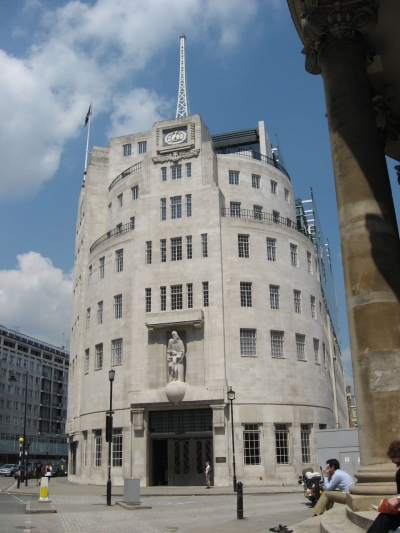Anthony Kenneth Blackburn (born 29 January 1943) is an English disc jockey, singer and TV presenter. He first achieved fame broadcasting on the pirate stations Radio Caroline and Radio London in the 1960s, before joining the BBC, on the BBC Light Programme. He was the first disc jockey to broadcast on BBC Radio 1 at its launch, on 30 September 1967, and has had several stints working for the corporation. He has also worked for Capital London and Classic Gold Digital, and currently BBC Radio 2, BBC Local Radio, and British Forces Broadcasting Service. He has also had a singing career.
In 2002 Blackburn was the first winner of the British reality TV series I'm a Celebrity...Get Me Out of Here!
The BBC Light Programme was a national radio station which broadcast chiefly mainstream light entertainment and music from 1945 until 1967, when it was replaced by BBC Radio 2 and BBC Radio 1. It opened on 29 July 1945, taking over the longwave frequency which had earlier been used – prior to the outbreak of World War II on 1 September 1939 – by the National Programme.
The service was intended as a domestic replacement for the wartime General Forces Programme which had gained many civilian listeners in Britain as well as members of the British Armed Forces.

1967Sep, 30
BBC Light Programme, Third Programme and Home Service are replaced with BBC Radio 2, 3 and 4 Respectively, BBC Radio 1 is also launched with Tony Blackburn presenting its first show.
Choose Another Date
Events on 1967
- 15Jan
Green Bay Packers
The first Super Bowl is played in Los Angeles. The Green Bay Packers defeat the Kansas City Chiefs 35-10. - 28Apr
Muhammad Ali
Vietnam War: Boxer Muhammad Ali refuses his induction into the United States Army and is subsequently stripped of his championship and license. - 30May
Nigerian Civil War
The Nigerian Eastern Region declares independence as the Republic of Biafra, sparking a civil war. - 7Jun
Jerusalem
Six-Day War: Israeli soldiers enter Jerusalem. - 2Nov
Lyndon B. Johnson
Vietnam War: US President Lyndon B. Johnson and "The Wise Men" conclude that the American people should be given more optimistic reports on the progress of the war.

 English
English  español
español  français
français  português
português  русский
русский  العربية
العربية  简体中文
简体中文 